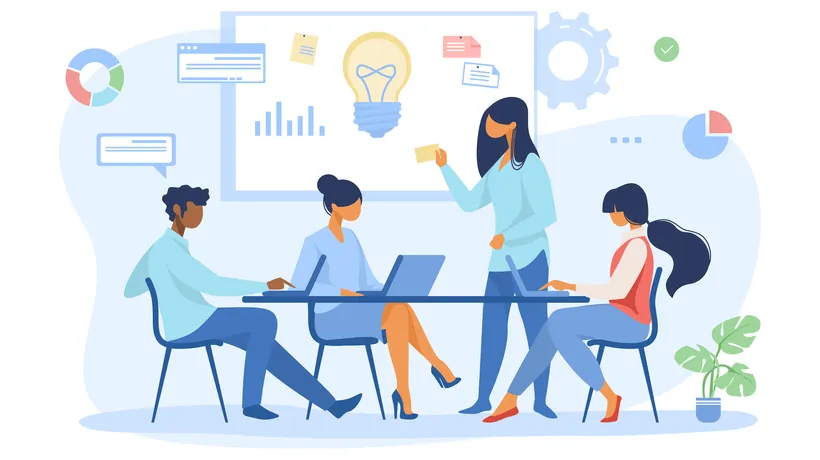Starting to provide excellent customer service in Nigeria is like figuring out how to navigate a busy market. Along with the lively atmosphere and varied customers, you’ll face many problems that could either help or hurt your business’s growth. In this piece, we’ll learn about the exciting world of customer service and the issues that companies in Nigeria often face. We’ll break down these problems, from communication problems to cultural differences, and give you the tools you need to solve them.
Here are 6 everyday challenges of providing customer service in Nigeria
- Lack of Infrastructure
- Cultural differences
- Limited access to technology
- Quality of service provided
- Employee training and development
- Inefficient feedback mechanisms
1. Lack of infrastructure
One of the everyday challenges of providing customer service in Nigeria is the lack of infrastructure. Problems like an unstable power source or slow internet connection can make giving your customers a smooth experience harder. Imagine quickly answering customer questions when your internet connection isn’t stable or handling payments quickly when your power isn’t stable. Inadequate infrastructure not only makes it hard to do business, but it also hurts customer trust and happiness.
As a business owner, you must plan and invest in other ways to deal with these problems. Taking proactive steps, like setting up backup power sources or using cloud-based systems, can help you overcome technology problems and improve your customer service efforts.
To deal with the lack of facilities, you might want to try the following:
- Adaptation and innovation: Take advantage of new technologies and seek other ways to circumvent infrastructure problems. For instance, you could use mobile technology to communicate and do business or use green energy sources to help with power supply problems.
- Strategic location choice: If you want to open a business, choose a place with good access to infrastructure, such as reliable power, internet, and transportation networks. Do a lot of study and consider how close you are to customers, suppliers, and the services you need.
- Infrastructure investment means pushing projects to improve them while working with local governments and community groups. You can join public-private partnerships or fund neighbourhood projects that enhance roads, utilities, and communication networks.
- Diversification of supply chain: To avoid being too dependent on a single place or infrastructure system, diversify your supply chain. Get your materials from multiple suppliers or areas to lower the risks associated with infrastructure problems.
- Planning for business continuity: Make robust backup plans in case something goes wrong with the systems your business depends on. Set up backup systems, find other communication methods, and store essential resources to keep the business running despite problems.
- Adopting technology: To get around infrastructure problems, use technology options like cloud computing, tools for working from home, and digital communication platforms. These tools help businesses work together and run smoothly even when infrastructure isn’t perfect.
2. Cultural differences
To give excellent customer service in Nigeria, you must know how to deal with regional differences. As a business owner, you deal with customers from various ethnic backgrounds. These differences show how people talk to each other, what they expect, and how they see service. In some cultures, what is excellent or helpful might be seen as rude or inefficient in others. For example, some people may like to talk to you directly, while others may prefer to talk to you more indirectly and nuancedly. Problems with providing good service experiences can also arise because of language barriers and different views on time.

If you want to deal with cultural differences in customer service successfully, try some of the following:
- Training in cultural sensitivity: Teach your customer service staff a lot about being culturally aware and sensitive. To help them understand and empathise with different customer groups, teach them about their cultural norms, habits, and communication styles.
- Support in multiple languages: Offer support in multiple languages to help people who speak different languages. If you want to communicate well with people from other cultures, hire staff who speak more than one language or use translation services.
- Changes in communication styles: To connect with people from different cultures, change how you talk to them. Do not use slang, idioms, or colloquialisms that could be offensive or misread. Instead, use clear and simple words to get your point across.
- value for cultural norms: When talking to customers, show that you value their cultural norms and practices. Don’t judge or assume things based on ethnic stereotypes. Show that you value cultural diversity and work to ensure all your customers feel welcome.
- Flexible policies and practices: Make sure policies and practices are flexible enough to consider national values and preferences. Be willing to change how you provide services to meet the wants and needs of different customer groups. This could mean giving customers more ways to pay, changing service hours, or changing the products they can buy.
- Feedback and continuous improvement: To find ways to improve, ask customers from various ethnic backgrounds for feedback. Listen to their concerns and ideas, and use what they say to improve your service. Adopt an attitude of always learning and improving to help your organisation become more culturally competent.
3. Limited access to technology
One of the everyday challenges of providing customer service in Nigeria is Limited access to technology. It might be hard to interact with many customers online because they don’t have reliable internet connections or digital devices. This limitation can make it harder to use communication channels like live chat, email help, and social media, which are increasingly important in this digital age. Because of this, companies may find it hard to answer customer questions quickly or solve problems well.
To overcome this problem, finding other ways to communicate with people without access to technology is essential. This could mean providing customer service over the phone, through text messages, or even in person. Investing in improvements to technology infrastructure, like making the internet more accessible and giving everyone access to cheap devices, can also help close the digital gap and make customer service more accessible.
Businesses If you want to fix the problem of not having enough technology in customer service, try these ideas:
- Simplify communication channels: Give customers with different technology levels access to other communication methods. Offer standard channels like phone support and in-person help and digital ones like email and chat for people who can’t use computers well.
- Mobile-friendly solutions: Create interfaces and apps that work well on phones so that people who primarily use smartphones to connect to the internet can use them. Also, ensure that your website and customer service tools work well on mobile devices so people can easily interact with you.
- Offline support choices: Offer offline support choices to customers who don’t have reliable internet access. Offer ways to contact you when you’re not online, like SMS, IVR (Interactive Voice Response) tools, or even snail mail, for questions, comments, and requests for help.
- Community engagement: Start customer service programmes in communities where people don’t have easy access to technology. Work with community centres, government agencies, or local groups to hold support groups, workshops, or training programmes for people in person.
- Outreach programmes for technology: Start outreach programmes for technology that will help connect underserved areas to the Internet. If people and companies can get free or cheap access to technology devices, the Internet, and digital literacy training, they should be able to take part in online activities.
- Collaborations and relationships: Form relationships with phone companies, tech companies, or government agencies to boost technology infrastructure and access in areas that aren’t getting enough. Work together on projects to make the internet reach more people, set up public Wi-Fi networks, or give low-cost tech options to communities that need them.
- Education and training: Provide technology education and training programmes for people without access to technology to help them learn how to use technology better. Help people correctly use digital tools and platforms by providing materials, workshops, and online tutorials.
4. Quality of the service provided
Nigeria’s businesses must ensure they provide high-quality services, but this is not easy. Customers can become unhappy and lose trust if service standards aren’t always met, wait times are too long, and mistakes are made when orders are filled. Inadequate staff training, limited resources, and inefficient operations often worsen this problem.
to overcome one of the everyday challenges of providing customer service in Nigeria, Consider putting these strategies into action to improve the level of service delivery:
- A culture focused on the customer: Make your company’s culture focused on the customer by putting their needs and wants first. Teach your workers to understand customers’ feelings, listen to their words, and always try to go above and beyond what they expect.
- Define service standards: Make sure your team knows the service standards and what you expect from them. Set up service standards, quality metrics, and key performance indicators (KPIs) to measure and keep track of the level of service delivery.
- Continuous training and development: Invest in ongoing training and development programmes to give your workers the skills, knowledge, and tools they need to provide excellent service. Offer regular feedback, workshops, and teaching to help people improve service delivery and close performance gaps.
- Implement service recovery procedures: To successfully deal with customer complaints, problems, or dissatisfaction, ensure you have robust service recovery procedures. Give frontline employees the power and tools to handle customer complaints quickly and politely, and you’ll turn bad situations into good ones.
- Monitor and measure performance: Set up ways to regularly check and record how well the service is doing. Use surveys, customer reviews, and satisfaction scores to find ways to improve and keep track of your progress over time. Use lessons from data to make intelligent choices and changes that will enhance the quality of your service.
- Streamline workflows and processes: To get the most out of your business and avoid mistakes or delays in service delivery, streamline your workflows and processes. Find and eliminate any bottlenecks, jobs that are done more than once, or steps that aren’t needed that could hurt service quality or customer satisfaction.
- Use technology: To improve the efficiency and usefulness of service delivery, use technology solutions like customer relationship management (CRM) systems, service automation tools, and predictive analytics.
- Empower frontline employees: Give them the freedom, authority, and tools to make real-time choices and provide personalised service solutions. Encourage people to solve problems independently, and give your staff the freedom to go above and beyond to make customers happy.
5. Employee training and development
Customer service depends heavily on how well you train and develop your workers. Businesses in Nigeria need to ensure that their employees get the proper training to deal with various problems. Thorough training in everything from product knowledge to communication skills gives your workers the tools to handle customer questions and concerns well.

Customer service can be challenging in Nigeria because people have different cultural standards and norms. Because of this, it is very important to put money into training programmes that help people understand and be sensitive to other cultures. You can help your team give more personalised and respectful service by ensuring they know your customers’ cultural differences.
If you’re having trouble with training and developing your employees, try adopting the following strategies:
- Training needs assessment: To find training gaps and areas for improvement, conduct a full assessment of your employees’ skills, knowledge, and competencies. Use performance reviews, skill tests, and employee comments to tailor training programmes to each employee’s needs.
- Set clear training goals: Set clear training goals and objectives that align with the company’s and the workers’ career goals. Ensure that training programmes are helpful and cover specific skill or performance gaps found during the needs assessment.
- Structured training programmes: Create structured training programmes that include regular classroom training, training on the job, workshops, e-learning modules, and chances to work with a mentor.
- Offer ongoing learning opportunities: Encourage a culture of lifelong learning and growth by providing resources and opportunities for ongoing education. To improve their skills and knowledge, encourage workers to get certifications, attend industry conferences, join webinars, and engage in self-directed learning activities.
- Invest in leadership development: Find workers with great potential and invest money in leadership development programmes to help them become future leaders in the company.
- Encourage cross-functional training: To help workers learn new skills and share knowledge across departments, encourage cross-functional training and teamwork. To get experience with different roles and responsibilities, encourage your workers to participate in job rotations, cross-training programmes, and project-based assignments.
- Use technology for training: To make training programmes more efficient and less expensive, use technology-enabled training options like learning management systems (LMS), virtual classrooms, and online training platforms.
- Measure how practical training Is: Set up key performance indicators (KPIs) and metrics to track workers’ progress over time and assess the effectiveness of training programmes. Get feedback from participants, managers, and other essential people to determine how well the training worked, where it could be improved, and how to make decisions based on the facts.
- Create a supportive learning environment: Create a supportive learning environment so your employees feel comfortable taking chances, making mistakes, and learning from them.
- Encourage regular feedback and coaching: Managers and employees should have regular feedback and coaching talks to provide ongoing support, guidance, and mentorship. Give your workers chances to get feedback on their work, set goals for improvement, and get helpful suggestions on how to improve.
6. Inefficient feedback mechanisms
Regarding feedback systems that don’t work well, it’s essential to make it easier for customers and your business to talk to each other. Set up feedback channels that are easy for people to use, like online polls, suggestion boxes, or specific email addresses. Get customers to give you feedback regularly, and ensure you answer their questions or address their issues quickly. You should also teach your employees how to actively listen to customer comments and use them to improve how they provide service. By emphasizing feedback systems that work, you can get helpful information that will help you improve your customer service and quickly fix any problems.
To fix feedback systems that don’t work well, think about the steps below:
- Set up multiple channels: To meet the needs of a wide range of customers, provide multiple ways for them to give feedback, such as online forms, emails, phone calls, and social media sites.
- Simplify feedback processes: Ensure that the feedback process is clear and easy to use so that customers don’t exert too much effort to express their opinions.
- Quick responses: Show that you value customer feedback by responding quickly to their comments. Recognise their worries, give them helpful information, and offer answers or reassurances if possible.
- Regular monitoring: Check feedback outlets regularly to see how customers feel and spot any problems or trends that need your attention.
- Continuous improvement: Make changes to goods, services, and processes based on your feedback. Deal with customer complaints and ideas by incorporating them into your business plans.
- Staff training: Stress the importance of listening carefully, relating to customers, and giving the correct answers to teach your workers how to deal with feedback well.
Read also. What Are The Most Affordable Marketing Strategies For Nigerian Businesses?
Conclusion
In conclusion, training and employee growth are essential to providing good customer service in Nigeria. By investing in your team members’ ongoing growth and skill development, you can deal with the unique challenges of customer service in this diverse and changing market. As you work to improve the quality of your services and make customers happier, remember that your workers are your most valuable assets. Your business will do well if you give them the tools and information they need to do their best.
Are you ready to grow your business? Today, add your business to our online list and make it known to thousands of people in Nigeria who might be interested in buying from you. Sign up your business right now to get more chances to grow and succeed.



